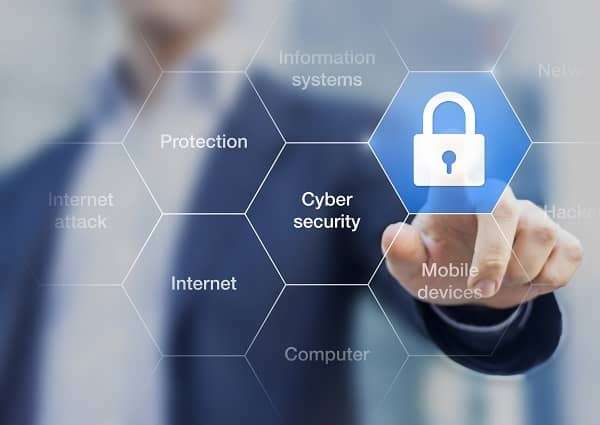The rise of digitization has resulted in an increase in cyber attacks. Organized cybercrime is quickly becoming a problem that security firms are struggling to combat. Our need for data security and privacy is greater now than ever. Since so much of our information is now kept online permanently, there is always a risk that it may be stolen. Stories about threats to both personal security and the security of well-known worldwide corporations dominate the news cycles.
So, what is the solution? More cyber security experts.

Before we proceed with how to get started in cyber security, let’s delve into what exactly cyber security is, what working in this field entails and what professional alternatives are there in this world that is expanding so quickly. We’ll respond to all of these queries, giving you a solid foundation for beginning a career in cyber security.
What Is Cyber Security And Why Is It Important?
Cyber security is the protection of systems connected to the internet against cyber threats, including their hardware, software, and data. People and businesses use the method to prevent unauthorized access to data centers and other digital systems.
Defending servers, computers, mobile devices, and networks from malicious cyber threats to protect the data and information stored on them has become a critical component of any business that uses cloud computing to store its data. And as the likelihood of phishing, malware, and ransomware threats grows, so does the cyber security landscape. The global cyber security market is expected to grow at an 8.9% CAGR, reaching USD 266 billion by 2027, up from USD 173.5 billion in 2022.
How to Know if Cybersecurity Is Right for You?
The world definitely requires more cyber security professionals to combat these cyber threats, and it’s a career you’ve always wanted to pursue. But how do you know if a career in cybersecurity is the right fit for you?

Not every individual is born with the innate qualities that make them suitable for the profession. The best way to determine whether a career in cyber security is right for you is to learn more about it, appreciate how much commitment it requires to lifelong learning, and observe it in action.
Understanding some of the similar traits shared by the best cybersecurity professionals can help determine if you have what it takes to compete with them.
Cyber Security Prerequisites
To become a cyber security specialist, you should finish a formal education in information security or a related field—such as a degree or Cybersecurity Bootcamp.
By obtaining a degree or certificate in cyber security or a related field, you can begin your path to becoming a cyber security specialist. You can study cyber security at any level; in addition to associate, bachelor’s, and master’s degrees, some schools also grant certificates for passing a particular course. But, do you need a degree in cyber security? Not always.

Other prerequisites to enter the field are:
- Understanding of firewalls and various types of endpoint security.
- Knowledge of programming languages/tools such as C++, Java, Node, Python, Ruby, Go, or Power Shell is advantageous.
- The ability to perform under pressure and in a fast-paced atmosphere.
- Have a keen eye for detail and exceptional problem-solving skills.
- Knowledge of the most recent Cyber Security trends and hacker techniques.
Top Skills Required for Cyber Security Jobs
A career in cybersecurity is excellent for generating a steady income, ensuring excellent job security, and providing you with a wealth of opportunities to pursue. Make sure your reasons for wanting to work in cyber security are sound.

Soft Skills
Here are a few soft skills to help you determine whether you are naturally inclined to this field.
Analytical Thinking
The use of analytics or the capacity to incorporate significant patterns into data is required in specific cybersecurity fields. For cyber professions, it is crucial to use the correct analytical skills, such as interpreting, responding, and sorting the data into meaningful, actionable patterns.
Problem Solving
Problems, namely those involving sensitive data and financial information, are at the heart of cyber security. Effective problem-solving is necessary for cyber professions since “cyber security” deals with sensitive data that might present significant threats to a business. Cybersecurity may be your ideal career if you enjoy finding solutions to computer security issues.
Thinking Like a Hacker
It’s not as simple as it may appear to think like a “hacker,” you have to learn how to disassemble things, understand how they operate internally, and spot potential weaknesses in the system. Cyber security is the ideal career for you if you enjoy disassembling systems, making improvements, and reassembling the pieces to understand how they operate.
Ready for Challenges
Problems and the difficulties they provide are the core concepts of cyber security. Cybersecurity may be your ideal career if you like to take on challenges head-on. These difficulties require competence and confidence because they include sensitive information and big stakes.
Communication Skills

Communication skills are often set on the “backburner” with technology careers. Developing and improving the social side of a cyber security job can and will set you apart from the competition.
However, developing soft skills like strong communication skills, cultivating effective and professional manners, and being responsive and quick are a few important cyber security skills required when working in corporate settings.
Collaborative Skills
Cybersecurity is crucially dependent on integrating security controls, measures, and procedures into systems. To coordinate the necessary actions, you must collaborate with other teams, departments, and organizations as a security professional. As a cyber expert, you must learn to work well with others because the security of a network depends not only on the IT security team but also on all end users an organization employs.
Like any industry, a career in cybersecurity necessitates a strong set of technical skills.
Technical Skills
It is frequently emphasized that the most crucial talent required for cyber security careers is advanced technological skills. A successful cyber profession depends heavily on having strong technical skills because you will be working with technology most of the time. The most crucial kind of expertise will always be technical skills unless someone holds a senior-level managerial role.

Start with the basics. Learn the basics of general information technology and information security.
Starting from here, you can specialize in various cyber security positions, such as management, compliance, network security, penetration testing, programming, etc.
Everything You Need to Know About Cyber Security Careers and Jobs
There are numerous opportunities for professionals to begin and advance their careers in cyber security.
After completing your educational path and developing a broad range of hard skills, you can gain on-the-job experience. Cyber security specialists typically begin their careers with entry-level positions and advance to senior experts, as is typical for most professions.
Read this if you want to learn how to get started in cyber security with no prior experience.
Entry Level Roles
Aspiring cybersecurity professionals have the chance to develop their skills through hard-earned experience and establish themselves in entry-level positions. Once you’ve landed your first job, you can start laying the groundwork for a successful career.

Cyber Security Technicians
A cyber security technician manages, updates, and plans for the security of computers on a network, frequently responding to user tickets and carrying out daily operations in accordance with a company’s security policies.
Incident Analysts
An incident analyst investigates emerging security issues, breaches, and privacy concerns. A person in this position may diagnose security issues or collaborate with their company to develop methods to avoid similar problems in the future. Incident Response may be a good fit if you have skills like attention to detail, technical writing, and knowledge of documentation intrusion detection tools.
IT Auditors
IT auditors oversee risks and controls for their employers’ computer systems and networks. Professionals in this position frequently collaborate to look for vulnerabilities and proactively create security breach prevention strategies.
Intermediate Level Roles
Once you’ve worked in the industry for a few years, you can start looking for ways to advance to a mid-level position. These positions might call for you to assume more managerial duties, such as supervising cyber security interns, giving more project guidance, or taking the initiative on new projects. A few intermediate-level roles are:
Cybersecurity Analyst
A cybersecurity analyst installs security software and firewalls, monitors systems for problems, and looks into security breaches. As opposed to an entry-level technician, a security analyst is less likely to be given the task of one-on-one client support.
Penetration Tester
A penetration tester searches for security holes in software, networks, and systems using hacking expertise, advanced coding, and social engineering. Someone in this position could create tests and tools to look for threats.
Cyber security Consultant
A cyber security consultant may work independently or as part of a team to evaluate the security solutions in place, offer clients suggestions for better self-defense, or conduct threat research.
Senior Level Roles
As a senior-level cybersecurity professional, you are at the pinnacle of your cyber security career path. You could manage teams or entire networks, operate your own business, or create and invent brand-new cybersecurity tools.
Cyber Security Administrator
A cyber security administrator plans and directs the work of a cyber security team while managing and supervising the application of security technology throughout an entire system or business.
Cyber Security Architect
A cyber security architect develops and implements an entire strategy for security and safety throughout an organization, constructing security measures from the ground up with a system-wide perspective.
Cybersecurity Engineer
A cybersecurity engineer develops security policies, builds security frameworks, and creates new security solutions using high-level programming skills.
Get Your Cyber Security Certifications
Given the diverse nature of cyber security expert work, not all employers require extensive professional experience when hiring. Some companies hire these professionals in entry-level positions, allowing them to gain on-the-job experience.

Some companies may require cybersecurity professionals to have a certain level of professional experience. Candidates can meet this requirement by gaining experience in other cyber security roles or through internships while still pursuing their cyber security degree.
You must first complete high school or earn a GED to work as a cybersecurity professional. You can sign up for classes to help develop your cybersecurity skills during this time. Computer science courses like computer programming and software development will be a great starting point for a future career path as a cyber security professional.
Certifications are a great alternative if you want to work in the cyber security space but lack the time or resources to pursue a four-year degree. Additionally, they are widely accepted in the sector. The most well-known programs include:
CompTIA CySA+
This certification provides people with information on how to handle threats and security flaws in software systems. Although no prerequisite experience is needed to take this certification exam, working with software for a few years may help you ace this course.

Certified Information Systems Security Professional (CISSP)
The International Information Systems Security Certification Consortium (ISC) developed the Certified Information Systems Security Professional (CISSP) information security credential for security analysts. The certification was designed to guarantee that experts in computer security possess uniform knowledge of the subject.
CompTIA Security+
This certification validates a person’s understanding of cyber security issues and solutions and their ability to work with software systems. It is designed for IT professionals with prior experience. This certification must be renewed every three years.
Certified Ethical Hacker (CEH)
The International Council of Electronic Commerce Consultants has a new program called the Certified Ethical Hacker (CEH) Certification that calls for some understanding of cyber security defense and standard hacking techniques. To take the certification exam, candidates must have two years of software experience.
Industries Where Cybersecurity Professionals Can Work
The lack of cyber security talent impacts almost every sector and industry as cybercriminals continue to target businesses, critical infrastructure, and governments worldwide.

However, a few sectors are particularly hurting and have a pressing need for qualified and experienced cybersecurity professionals. Suppose you’re thinking about a career in cyber security. In that case, you should know that wages are skyrocketing, and plenty of job opportunities are available, especially in these top cybersecurity-related industries.
Financial Services
In the financial services industry, hackers have a lot of opportunities. Customers use the internet to pay bills, shop, check their account balances, and send money to friends. The financial sector is woefully unprepared, and financial institutions are 300 times more likely to be a target than other businesses. Password attacks have increased by 74% in just one year, with an estimated 921 attacks occurring every second worldwide.
Government
The government is not known for its speed, and its cyber security capabilities are dangerously behind. When you consider the enormous amount of data stored there—possibly the most extensive data repository in the world—the vulnerabilities in government systems are concerning. In contrast to the private sector, the government is a gold mine of information for hackers that, if revealed, could jeopardize national security. Regrettably, the government’s inability to secure enough cybersecurity talent is a major contributing factor to its inability to secure its data adequately.
Healthcare
The high value of the data that healthcare organizations possess and the ease with which hackers can access this data are the two main reasons why these organizations have been frequent targets of cyber attacks. Cybercriminals buy and sell personal data on the black market for various uses, including espionage and identity fraud, using the information obtained from insecure systems.
The statistics on healthcare data breaches unmistakably demonstrate an upward trend over the past ten years, with 2021 recording the highest number of reported data breaches since records first began to be made available by OCR. According to HIPAA, healthcare data breaches involving 500 or more records were, on average reported 1.95 times per day in 2021.

Manufacturing
Cybercriminals use a variety of strategies, including attacks on vital infrastructure, industrial espionage, phishing emails, and drive-by downloads, which can result in sensitive data loss, faulty products, production delays, physical damage, injuries, and even death.
Retail
Hackers can be exploitative shoppers, and they see the retail sector as a potentially open target. Numerous well-known retailers have experienced data breaches, and the retail industry is actually a top target for cybercriminals, particularly in light of the increasing pressure from eCommerce juggernauts forcing more and more retail transactions online.
Conclusion
Security will remain a top priority for businesses as they migrate to digital infrastructure, despite the threat posed by emerging AI and automation technologies. The Bureau of Labor Statistics predicts a 33% increase in Information Security Analyst jobs between 2020 and 2030.

The cybersecurity industry has a lot to offer prospective employees because there is a growing need for qualified professionals. In this industry, salaries are frequently lucrative, and there are many opportunities for professional advancement.
The ICOHS College’s Certified Cyber Security Program can be completed in just 12 months and trains students to pass the following professional certifications:
- CompTIA A+
- CompTIA Network+ +
- CompTIA Security +
- CompTIA PenTest+
- CompTIA Cloud+
- CompTIA CSA+
Scholarships and Title IV financial support are also available to assist students with tuition costs. Call us at (858) 581-9460 to speak with one of our representatives, or email us to learn more. Start looking into your educational options right away if you’re ready!
FAQs
Is It Too Late to Start a Career in Cybersecurity?
Although it may sound cliché, it is never too late to pursue a career in cybersecurity. Anyone, regardless of educational background, can enter the cybersecurity field if they are passionate about the subject and willing to put in the effort to acquire the skills and knowledge required.
How Quickly Can I Learn Cyber Security?
It will take four years to finish a cyber security bachelor’s degree. You can then pursue a Master’s degree for two years. Alternatively, you can study cybersecurity using online tools and programs. You’ll need to do this for anywhere between six months and a year to learn the fundamentals and be prepared for a job.
Will AI Replace Cyber Security Jobs?
Both yes and no is the answer. While the vast threat landscape of today necessitates cyber security automation, its current functionality will not take the place of cyber security professionals. Automation in cyber security is undoubtedly becoming more prevalent.










